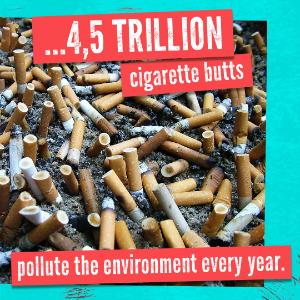News
Tobacco is killing us and our planet

Smoking kills. But on World No Tobacco Day 2022 (May 31) North East campaigners are warning that tobacco and tobacco companies are killing the planet and harming the beaches and environment in the region.
Figures show cigarette butts make up the vast majority of litter items (66%) in real numbers, with most ending up in landfill sites as toxic non-biodegradable waste. Around 2.9 million cigarettes are consumed every day in the North East, resulting in around 158 tonnes of waste annually including 66 tonnes discarded as street litter.
A researcher from Fuse at Durham University has detailed the harm of tobacco on the global and regional environment.
Fuse associate Andrew Russell, Professor of Medical Anthropology and Degree Director for the Global and Planetary Health MSc at Durham University, said: "Tobacco is the source of the bulk of street litter in the North East of England, and the plastics and other toxins in cigarette butts can leach out into the water supply, harming fish and other aquatic species.
"It also causes deforestation, both for its industrial-scale cultivation and to provide wood for the curing process.
"Tobacco is a hungry crop – it absorbs heavy metals such as lead, cadmium and mercury from the soil along with the nutrients it needs to grow.
"That’s before you consider the chemical fertilisers and pesticides that are administered to the growing of plants, often days before they are harvested.
"These all contribute to the 7,000 chemicals that are found both in cigarettes and the tobacco that goes into roll your own pouches."
World No Tobacco Day is a national campaign by the World Health Organisation and the theme of 2022 is to raise awareness how tobacco is Poisoning our Planet. Tobacco kills over 8 million people every year but also destroys our environment through tobacco growing and production, distribution and waste, with:
- 600 million trees chopped down for tobacco equating to 200,000 hectares of land
- 84 million tonnes of CO2 released into the air raising global temperatures
- 22 billion tonnes of water used to make cigarettes
- 4.5 trillion cigarette butts not disposed of properly every year across the globe, generating 1.69 billion pounds of toxic waste and releasing thousands of chemicals into the environment
Watch ‘Tobacco is killing us and the planet’
North East reps from Surfers Against Sewage have also joined calls for more to be done to protect the region’s beaches from plastic cigarette butts, as a recent YouGov survey commissioned by ASH found 81% of North East adults agreed that cigarette butts that contain plastic should be banned to protect the environment.
Ailsa Rutter OBE, Director of Fresh and Balance said: "Most people know smoking kills - but too rarely do we ever stop think about how tobacco is polluting our world globally and here in the North East where we have a fantastic coastline.
"Cigarette filters are made up of thousands of tiny plastic particles. One single filter puts plastic into the marine environment, while cigarette filters also contain a cocktail of harmful chemical ingredients including arsenic, lead and nicotine that pollute our soil, waterways and seas, harming wildlife.
"It is one more reason to quit smoking and to make tobacco companies pay for the pollution they cause."
She added: "Tobacco companies make billions of pounds around the world in profits and focus production in the developing world, causing deforestation and using vital land which could be used to grow food and creating sickness and illness among workers. Tobacco companies are increasingly trying to 'greenwash' their reputation and products by marketing themselves as environmentally friendly and we should not believe a word of it.
"We are calling now on the Government to carry through its promise for a Smokefree 2030. Fewer people smoking will not only reduce the impact on our communities and healthcare but also on our environment and the burden of litter on local authorities."
Last modified: Tue, 31 May 2022 07:53:09 BST





